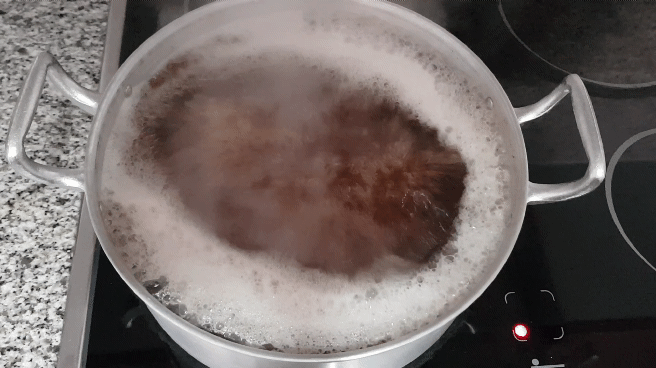A heavy rolling boil is essential for a clean beer. 90 minutes is the optimal time, however, a shorter boil is acceptable. You must carefully tailor your brew session to your specific time and spatial constraints.
60-minute boils are suitable for the dense extract worts of beginner to intermediate brewers. For advanced brewers, high-volume 90-minute boils are optimal for O2 pick-up, fermentation health, and allow proper time for hop bittering.
Why a Long Boil?
A heavy rolling is the target for any brewer, beginner to advanced, homebrewer to professional. It symbolizes the essence of beer making, its heavy sweet smell diffusing throughout your home.
The longer your boil, the more concentrated your sugars (maltose- malt sugar). If your sugars are more concentrated, the easier it is for the yeast to metabolize them and attenuate (ferment down) to an ideal level.
One key feature of concentrating sugars is browning, or coloring in the kettle. As we boil we produce melanoidans in the beer. These compounds occur naturally during malting and can add color and complex flavor to beer.
When you begin to brew with raw barley malt, you will extract your own sugars from the grain. This is a natural evolution of the intermediate brewers, adding extra steps and complexity. It is time consuming but a joy to passionate brewers.

Creating the Hot Break
Here, a long boil time is essential. Proteins and solids will come from your mash that have been excluded from your extract brewing. The boil allows them to coagulate and precipitate out. This is called the hot break. This trub /troob/ later separates at the boil’s completion (knock-out).
All of the physical properties and chemical processes of boiling are called kettle reactions. May beginning homebrewers experience bumps in the road with subsequent off-flavors in their beer. A number of these can be traced back to an improper boil and adverse kettle reactions.
O2 Capture
Oxygen capture is essential for a healthy fermentation and delicious beer. Next to sugar, O2 is what yeast needs most. Without the oxygen, yeast cannot properly respire (multiply) during pre-fermentation and will not have a stable nor healthy cell count for good fermentation and attenuation.
A 90 minute boil ensures the O2 folds into the beer and bonds with the sugar molecules. A 60 minute boil will do this as well, but any less is sincerely not recommended.
Hop Utilization

The goal of hop use is to add balance, flavor and character to your beer. We extract the desired characteristics from the hops by utilizing the iso-alpha acids. True hop character necessitates a longer boil, at least partially so.
It is true that flavor hops, added the last 8-12 minutes of a boil may not be affected by the length of the boil. Also aroma hops, added just as the boil is concluded are also potentially unaffected.
We are not using these two additions for bitterness, rather the spicy, tart, garden-like flavor they add. The aroma hops are for bouquet. They may add a fruity nose to the beer. As the carbonation drifts up and off gasses, these hops release their character, floral and delicate.
For bittering hops, they are added the last 80 or 60 minutes of a boil. We want the bittering properties only and are not concerned with their flavor. Hops will have different flavors, even for bittering, but the timing is critical here. We measure hop effectiveness by isomerization (the percentage of oil extracted/ utilized during the boil).
At 60 minutes, hops utilize about 25% of their oils. This makes a 60 minute boil essential. However, there is one small problem. If you add hops at the exact start of the boil, it will inhibit good protein precipitation during your hot break. Therefore, boil at least 10 minutes before adding hops.
This is not as much of a problem for extract brewing, but definitely so for ½ and ½ brewing or for all-grain brewing. Additionally, when brewing with whole grains, the sugars are not concentrated and you need the time to properly condense your wort.
When is a Shorter Boil (30 min) OK?
Beginning brewers often use all-inclusive can kits to brew. This is completely OK, and can make nice beer. They have hop oil included and utilize malt extract, not raw malted barley. A 30 minute boil is sufficient to dissolve the sugar and create enough oxygen in the wort.
Most beginner and early intermediate homebrewers will boil 1- 1 ½ gallons of wort and dilute it with water later. Make sure you stir the mixture very well and if it is in a glass carboy, cap it and shake it very well. This mixes the malt and water as well as oxygentating it.
Unhopped Extracts
The first progressive step most beginners make is to add their own hops, a fine decision and fun. Here an addition of flavor and aroma hops may enhance your beer. However, be aware, due to the density of the wort, the isomerization (extraction of hop oils) is diminished.
Also, in these dense extract worts, they have high melanoidin concentrations due to the manufacturing process. Melanoidins are browning compounds caused by the combination of sugar and amino acids at high-temperatures. They can produce an unwanted characteristic what some call extract bite– a cloying sweetness that if not managed properly can detract from your beer. I recommend using the lightest possible extracts and using adjunct malts for coloring as soon as is practicable.
Experiment with hops at first. Later you will need to go heavy, adding more hops to get the desired effect.
What not to do, ever
Many years ago, ahem… in the 90’s, most beer kits came with their own packet of yeast, hop extract included in the malt, and instruction on the can. The instructions are summarized here:
- Empty your 3.3 pound can of malt into your fermenter. (Usually a plastic bucket)
- Add 3 pounds of corn sugar.
- Add 1-2 quarts of hot water to bucket and stir until dissolved.
- Add 4 more gallons of water, add yeast provided with kit.
- Wait two weeks, you should see visible activity during this time.
- Bottle and enjoy!
I’ll never understand what the marketing departments of the malt companies were thinking. They had quality malt, hop oil, and more often than not, stale ineffective yeast. They included glossy packaging, printed cans and pictures of refreshing mugs of beer.
This no boil beer recipe was antithetical to every brewing maxim there is. I just can’t imagine what they were thinking.
Boiling sterilizes beer!
Can I Boil Too Long?
It may be possible to boil too long, but I would say no.
We once boiled a beer overnight, about 8 hours. This was in a professional setting, about 15 US barrels. Out of a 800 pound grist of all pale malts we steeped only 17 lbs (2%) of Black Malt for color, and then only for 18 minutes pre-boil. We did add 50 lbs of Black Candi Sugar (Belgian brewing sugar).
Even with this tiny amount of coloring malt and sugar, the browning in the kettle caused the beer to emerge a deep glowing ruby red, almost brown when served in a pint glass. The Belgians have been known to brew certain beers for 24 hours, who knows the reason, only them and their brewery angels.
Conclusion
A good boil is essential to a healthy balanced beer.
- 60 minutes for the beginner. After 2-3 batches you may begin to add flavor hops and adjunct grains.
- 70 minutes for intermediate brewers. You are using all of your own hops, adjunct grains for flavor and color. You possibly are ½ and ½ brewer; using part raw barley malt and part extract.
- 90 minutes for an advanced brewer. This leaves ample time for sugar concentration, hop utilization, boil off, and oxygen absorption.
*The first batch or two, you may boil for 15-30 minutes only with hopped-extract kits. I encourage you to evolve from this level as soon as you are able.
The boil encompasses all kettle reactions. Take special care during this process. It will add stability and bring you one big step closer to brewing success.

